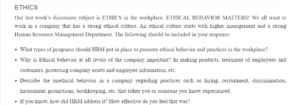HRM and Ethical Behavior
Ethical cultures characterize all companies. Ethical culture constitutes the characteristics of a company, which promote ethical conduct (Kaptein, 2008). According to Kaptein 2008, ethical virtues in companies include “…clarity, congruency of supervisors, congruency of management, feasibility, supportability, transparency, discuss ability, and sanctionability.” Accordingly, implementing these virtues contributes to the corporate ethical culture, influencing the business from higher management downwards. Therefore, the maintenance of ethical culture among higher management affects other employees to maintain the ethical culture. Subsequently, Human Resource Management, being part of the higher management, influences the ethical culture of a company, and therefore, there are various programs put in place to ensure corporate ethical behavior and culture.
What types of programs should HRM put in place to promote ethical behavior and practices in the workplace?
Human Resource Management can implement various programs to ensure ethical conduct (Schumann, 2001). The first program is the utilitarian principle, which determines how ethical an action is through examining the results, an action with the most good and the least harm for everyone involved. The second program consists of maintaining the principle of rights, whereby the methods applied during an action observe and promote other people’s rights, and the person performing the act has a right to perform it. The third program involves maintaining distributive justice, whereby the cost and benefit of the results of action should be equally distributed to everyone involved. The fourth program involves caring principles, whereby the effect of the action is examined with emphasis on the special relationships created by the person acting. Finally, the last program involves maintaining virtue principles, whereby the action performed should represent the virtues of the person performing the act (Schumann, 2001). These principles are the basis for the programs put in place by Human Resource Management to ensure ethical behavior.
Why is Ethical behavior at all levels of the company important? In making products, treatment of employees and customers, protecting company assets and employee information, etc.
Ethical behavior ensures the elevation of employees’ performance. Subsequently, the company makes a profit, and the business grows. Unethical behavior in companies arises from various actions, such as the wastage of company resources (Wiley, 2000).
Describe the unethical behavior in a company regarding practices such as hiring, recruitment, discrimination, harassment, promotions, bookkeeping, etc. that either you or someone you know experienced.
For instance, some employees in my workplace were misusing the company’s resources, which are time and the internet, by spending time on social media during working hours.
If you know, how did HRM address it? How effective do you feel that was?
Subsequently, the Human Resource Manager gave the individuals a warning, which was adequate for the misconduct.
References
Kaptein, M., 2008. Developing and testing a measure for the ethical culture of organizations: the corporate ethical virtues model. Journal of Organizational Behavior, 29(7), pp.923-947.
Schumann, P., 2001. A moral principles framework for human resource management ethics. Human Resource Management Review, 11(1-2), pp.93-111.
Wiley, C., 2000. Journal of Business Ethics, 25(2), pp.93-114.
ORDER A PLAGIARISM-FREE PAPER HERE
We’ll write everything from scratch
Question
ETHICS
Our last week’s discussion subject is ETHICS in the workplace. ETHICAL BEHAVIOR MATTERS! We all want to work in a company that has a strong ethical culture. An ethical culture starts with higher management and a strong Human Resource Management Department. The following should be included in your response:

HRM and Ethical Behavior
- What types of programs should HRM put in place to promote ethical behavior and practices in the workplace?
- Why is Ethical behavior at all levels of the company important? In making products, treatment of employees and customers, protecting company assets and employee information, etc.
- Describe the unethical behavior in a company regarding practices such as hiring, recruitment, discrimination, harassment, promotions, bookkeeping, etc. that either you or someone you know experienced.
- If you know, how did HRM address it? How effective do you feel that was?
- If you don’t know how the issue was resolved, how should HRM handle the issue?


